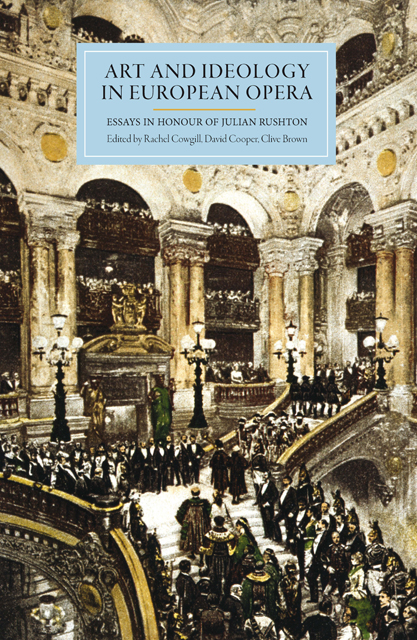Book contents
- Frontmatter
- Contents
- List of Figures
- List of Music Examples
- List of Tables
- Notes on Editors and Contributors
- Acknowledgements
- Introduction
- I Nationalism, Cosmopolitanism and National Opera
- II Opera, Class and the Politics of Enlightenment
- III Opera and Otherness
- Julian Rushton: A Family Memoir
- 7 The Works of Julian Rushton
- Index
- Tabula Gratulatoria
Julian Rushton: A Family Memoir
Published online by Cambridge University Press: 28 February 2023
- Frontmatter
- Contents
- List of Figures
- List of Music Examples
- List of Tables
- Notes on Editors and Contributors
- Acknowledgements
- Introduction
- I Nationalism, Cosmopolitanism and National Opera
- II Opera, Class and the Politics of Enlightenment
- III Opera and Otherness
- Julian Rushton: A Family Memoir
- 7 The Works of Julian Rushton
- Index
- Tabula Gratulatoria
Summary
Julian was born in 1941 into a musical family. His mother Marjorie was very active locally, as an oboist (and sometimes timpanist) in choral and orchestral concerts, and on the amateur-operatic scene in and around Cambridge. She was also secretary of the Cambridge Philharmonic Society and the Cambridge University Musical Society (CUMS) at various times, thus representing both ‘town & gown’. Julian's father William played bassoon, viola and violin, and the family's Cambridge home, ‘Shawms’, was visited by a constant stream of instrumentalists and vocalists. In his early years Julian must often have fallen asleep to the sound of his elder sister Gillian practising her cello, or Marjorie her oboe, and on many occasion he would have heard visitors singing madrigals or playing chamber music.
Julian's earliest known display of musical skill was a characterful rendering, at the age of five or six, of ‘Who's afraid of the Big Bad Wolf?’ on a large kazoo, which caused much hilarity among the family. Subsequently he took piano lessons, and later, when he joined his brother Adrian at Oundle School, he also had the opportunity to broaden his musical horizons by participating in large-scale choral singing and learning to play the clarinet. At Oundle he tried his hand at composing and making instrumental arrangements for occasional use, for example during the annual inter-house instrumental music competition: on one occasion his tactful arrangement for a ‘house ensemble’ of boys with varying abilities and not particularly compatible instruments sufficed to win the cup. Julian also wrote musical criticism for the school magazine, showing he already understood that such journalism should entertain and interest the reader, whether they have attended the concert or not.
As a father, Julian encouraged his children to learn and to perform, ensuring that music was part of their education and of their lives. Both his sons went to King's College Choir School in Cambridge; and although neither was a chorister, the boys learned to sing and play, and took part in various shows and concerts in King's College Chapel and the West Road music school.
- Type
- Chapter
- Information
- Art and Ideology in European OperaEssays in Honour of Julian Rushton, pp. 382 - 384Publisher: Boydell & BrewerPrint publication year: 2010



